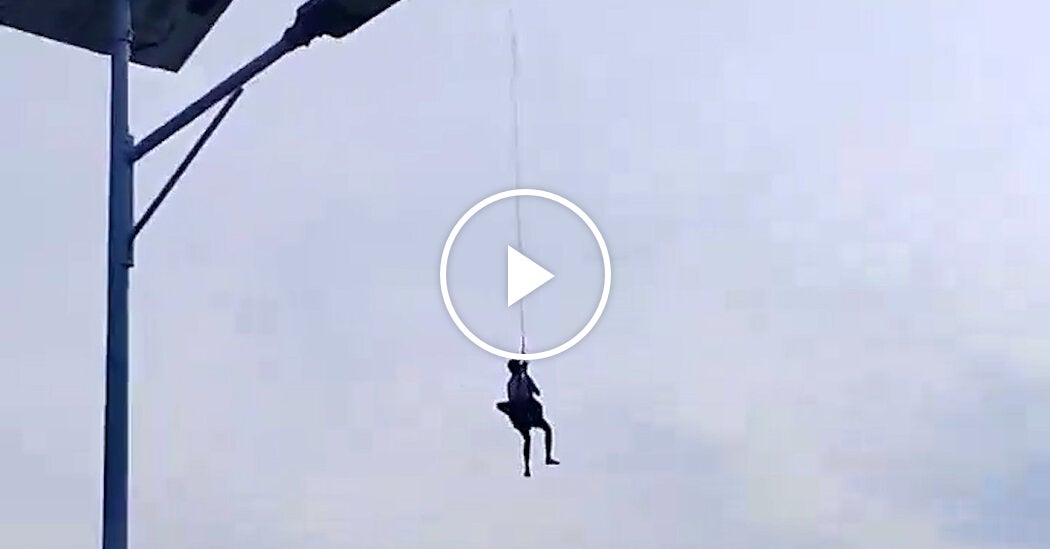When controversial rapper Ye’s new song praising Adolf Hitler was posted on social media platforms and music streaming services last week, most removed the antisemitic track within days.
But some experts say these companies are not fast enough to respond or not doing enough to prevent the posting of hateful content — which, in the case of the song by the hip-hop artist formerly known as Kanye West, had already been viewed and listened to by millions.
Vlad Khaykin, with the Simon Wiesenthal Center, says tech companies are “falling down on the job” of protecting the public from hate, incitement, harassment and intimidation.
“In this specific case, many of these platforms did take action to remove this from their platform. But the truth is it should have never had a presence on those sites in the first place,” said Khaykin, who is the human rights organization’s executive vice-president of social impact and partnerships for North America.
Imran Ahmed, CEO of the Center for Countering Digital Hate, agrees that these tech companies are not taking the most basic, common sense approach to systemically deal with content by “hate actors.”
Ye, the rapper formerly known as Kanye West, praised Hitler during a livestreamed interview with conspiracy theorist Alex Jones, his latest in a string of antisemitic comments. It’s reinforcing fears that such hate is going mainstream.
“There are so many things that they could be doing,” he said, whether hiring staff to specifically search for such hateful content or some more “sophisticated technological solution.”
“They could use the same tools that they used to identify copyrighted content.”
The companies are not transparent about what if any methods they use, he says.
“I can’t tell you whether or not there are people who are searching for the content.”
Ye’s song and video for Heil Hitler, which glorifies the Nazi leader and includes a sample from a Hitler speech, was removed from a number of streaming platforms, but remains on Elon Musk’s social media platform X.
It is just the latest antisemitic messaging by Ye, whose X account has been deactivated and reactivated over the past few years because of such posts. This past February, it was deactivated following posts which included Ye declaring himself a Nazi and saying “I love Hitler.”
But he was soon back on X, where his Heil Hitler (Hooligan Version) video is now nearing 10 million views.

Jim Berk, CEO of the Simon Wiesenthal Center, called out X for allowing the song — saying in a statement it had become Ye’s “partner in spreading vitriol against Jews” — and for allowing a “flagrant violation of its own rules.”
“We call on X to remove West from its platform and for other platforms and distributors to refuse to host or monetize this song,” he said. “There must be a clear line when it comes to glorification of genocidal regimes, particularly to millions of young people.”
Neither X nor Musk have responded publicly to these complaints. But a number of other tech platforms say they’ve pulled Ye’s song.
A spokeswoman for SoundCloud, said in an email to CBC News that the audio streaming platform had taken steps to remove nearly 400 versions of Heil Hitler.
YouTube says it removed the song and will continue to take down re-uploads, while Reddit says it has been removing the song and “any celebration of its message.”
Although Spotify did not respond, NBC reported that it also seemed to have removed the song from its platform.
WATCH | How should we treat Kanye West?
Certain tools to ID hateful content
However, Khaykin, from the Simon Wiesenthal Center, says we’re in an age of technology when certain tools, like AI, can identify problematic content before it is added to a platform.
In its annual Digital Terrorism and Hate Report Card, the centre rates how well major digital platforms combat online hate, antisemitism and extremism. The criteria includes how fast a platform removes such content once reported, and whether they have transparency reports with specific data on hate/terrorist content removals.
But the centre gave low grades to most of those platforms in its 2025 report — TikTok got a C, Spotify got a C-, and Cs also went to both Google/YouTube and Facebook/Instagram.
“It’s not really, I think, a matter of capability,” Khaykin said. “It’s really a matter of will. Does there exist the will to actually, seriously do something about it? And unfortunately, sometimes the will to do the right thing, it bumps up against the profit motive.”
Ahmed, with the Center for Countering Digital Hate, also questions the companies’ priorities.
“It’s worth remembering that these platforms, if you try and upload a few seconds of a copyrighted piece of music, it will be down in a heartbeat,” he said. “But they somehow seem incapable of taking action against a piece of content that glorifies in the murder of millions of Jews.”
“They seem to be placing less concern about that than they do about someone stealing three seconds of a Taylor Swift song.”

yes-song-praising-hitler-was-pulled-from-most-online-platforms-are-they-doing-enough
















Leave a Reply